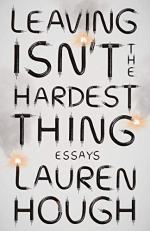|
This section contains 474 words (approx. 2 pages at 400 words per page) |

|
Leaving Isn't the Hardest Thing: Essays Summary & Study Guide Description
Leaving Isn't the Hardest Thing: Essays Summary & Study Guide includes comprehensive information and analysis to help you understand the book. This study guide contains the following sections:
This detailed literature summary also contains Topics for Discussion on Leaving Isn't the Hardest Thing: Essays by Lauren Hough.
The following version of this book was used to create this guide: Hough, Lauren. Leaving isn't the Hardest Thing. Good Dog Harper, 2021. Print.
Note that all parenthetical citations refer to the page number on which the quotation appears.
Hough begins her collection with the longest essay, "Solitaire," in which she describes the experience of being gay in the United States Air Force. Stationed in Shaw, South Carolina, Hough was the victim of a hate crime in which someone lit her car on fire because they knew she was gay. Hough undergoes a massive investigation and is accused of lighting her own car on fire, but is eventually exonerated. At age 23, she informs the military that she is gay and leaves as an honorable discharge. Throughout her trial, she recalls the experience of having grown up in the Children of God cult, where she was a victim of forced labor, sexual abuse, and indoctrination.
Over the next few essays, Hough describes her experience in the cult, the air force, and after she left the air force and moved to DC. She illuminates some of the cult's repulsive practices, like the frequent sexual abuse of children and their commitment to raping women. She explains that she had had similar experiences in the air force. After she moves to DC, she gets a job as a bouncer at a gay nightclub. While working at the club, called Badlands, she has some of her first queer sexual experiences and experiments with drugs.
As she continues the essays, Hough describes her relationships with men and how they have been fraught with violence and abuse. By contrast, she also details her relationships with women, admitting that though she felt "safer" than she had been with men, her ex-girlfriends often took advantage of her kindness. Hough also details a painful experience in which she spent seven days in isolation in the Special Housing Unit of a D.C. jail, after which she realizes how fortunate she was to be given a second chance.
Hough returns to her childhood, remembering her time in Amarillo, Texas after her family left the Children of God cult for good. She remembers how her mother told her never to talk about her past, and since then she has lied to everyone about the way she grew up. Now, Hough struggles with PTSD, and has to discreetly purchase marijuana in Texas because the antidepressants prescribed to her by the VA did not work. Hough recalls a number of stories from her time as a cable technician in Virginia when she was at the height of her depression. As the book concludes, she explains that everything about her past has led her to the conclusion that the "American Dream" is a myth, and that the only thing worth striving for is the experience of living truthfully.
Read more from the Study Guide
|
This section contains 474 words (approx. 2 pages at 400 words per page) |

|



